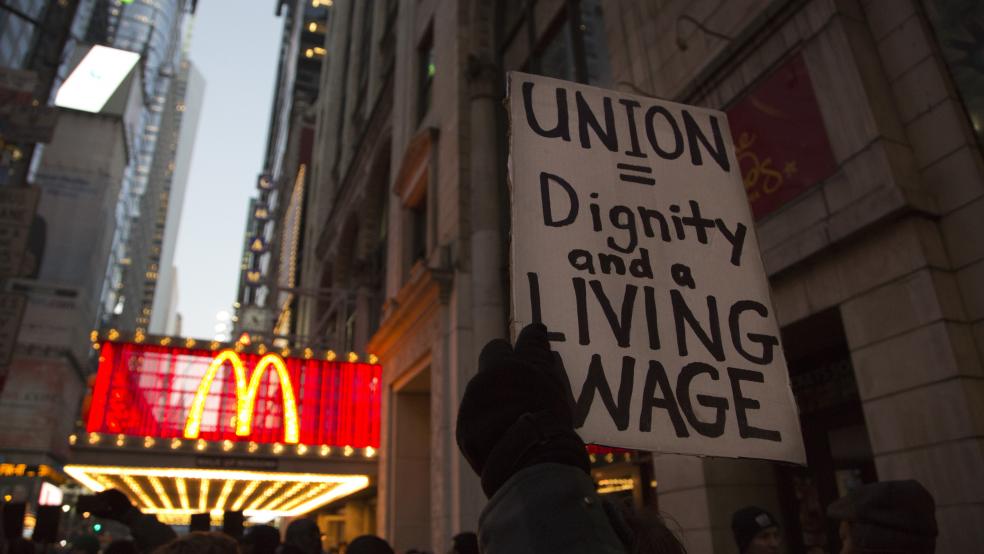It has become clear in the past week that for Democrats, the issue of a federal minimum wage increase can take one of two paths. The less likely is that they successfully pass a bill through both Houses of Congress, and wages go up for millions of workers. The second, far more likely outcome, is that they force Republicans to take a few politically difficult votes in the Senate, make noise about there being no progress in the House of Representatives, and then take the show on the road for the seven months leading up to the mid-term election.
It wouldn’t take the most cynical of minds to suspect that the latter outcome might actually be the Democrats’ preference. The public is broadly in favor of a minimum wage increase. Bloomberg, for instance, found support for raising the wage to $10.10 at 69 percent last month, though it falls considerably when people are informed that it might cost the economy jobs. But for sound-bite purposes, the minimum wage issue would be a very convenient stick for Democrats to beat Republicans with in the months leading up to the mid-terms.
Related: The Truth About Minimum Wage Workers’ Take-Home Pay
However, at least one senior Democrat is leaving the door open to actually getting a deal done. Senate Majority Whip Dick Durbin (R-IL) said this week that if Democrats find that they can’t gather the votes for an increase to $10.10, they might consider a lower figure. However, Senate Majority Leader Harry Reid (D-NV) has shown little appetite for compromise.
This week, with a presidential trip to Michigan, President Obama renewed his backing for a 40 percent increase in the federal minimum wage to $10.10 per hour, showing that while the president may need to keep his distance from some of the more vulnerable Democrats running in the Fall, he ‘s not ready to abandon the bully pulpit.
Related: Minimum Wage Hike Comes with Costs
“Now, raising the minimum wage is not going to solve all of our economic challenges,” he told a crowd in Ann Arbor. “The majority of folks who are working get paid more than the minimum wage. As Americans we understand that some people will earn more than others. But here’s one thing we do believe: Nobody who works full-time should be raising their family in poverty, right? If you’re working, if you’re responsible, you should be able to pay the rent, pay the bills.”
On Thursday, House and Senate Democrats met with representatives of Americans United for Change, a progressive group which is sponsoring a “Give America a Raise” bus tour. Top Democrats, including House Minority Leader Nancy Pelosi and Senate Majority Leader Harry Reid, joined the event, and called on other lawmakers to help pass a bill that would raise the minimum wage from $7.25 to $10.10 over the course of three years.
For Republicans, the minimum wage issue is difficult terrain on which to mount an effective defense. It’s not because no arguments exist that support their side. For example, the Congressional Budget Office earlier this year issued a report outlining the trade-offs inherent in an increase to $10.10 per hour. While many millions of workers would benefit, the CBO found, a side effect would be the elimination of as many as half a million existing jobs.
Related: Minimum Wage Hike Comes with Costs
However, “Give America a Raise” trumps “Hang on, this is complicated” in public debate, and on Wednesday, a post on the website of House Speaker John Boehner (R-OH) outlined what the GOP’s most likely approach to the argument will be. They’ll try to change the subject.
Titled “Five Facts that Undermine What the President Says About Wages,” the post actually says nothing about the minimum wage debate at all, but instead turns the discussion to the impact that the Affordable Care Act will have on employment.
“President Obama is heading to Michigan to talk wages today, but it’s his own health care law that is slashing the take-home pay of those who can least afford it by forcing employers to cut jobs and hours or risk triggering the law’s 30-hour penalty,” Boehner argues.
Tying the minimum wage increase to Obamacare may be a bit of a stretch, logically. But politically, it’s probably the best alternative Republicans have.
Top Reads from The Fiscal Times





